Eid-e-Milad holiday in Mumbai district rescheduled from 16 September 2024 to 18 September 2024.
Blog
Top Stories
Eid-e-Milad holiday in Mumbai district rescheduled from 16 September 2024 to 18 September 2024.
The Government of Maharashtra has issued a notification dated 13.9.24 rescheduling the public holiday of Eid-e-Milad to Wednesday, September 18, 2024 instead of Monday, September 16, 2024.
Copy of notification attached.
MSME Conclave 2024 Focuses on Funding the Backbones of India’s Economy
MSME Conclave 2024 Focuses on Funding the Backbones of India’s Economy
Mumbai – Micro, Small, and Medium Enterprises (MSMEs) are the backbone of India’s economy, comprising over 6 crore enterprises that contribute significantly to employment, innovation, and economic diversification. Despite their importance, MSMEs often face significant challenges in accessing adequate and timely finance, hindering their growth potential. The Bombay Chamber of Commerce & Industry hosted the 2024 MSME Conclave, focusing on the crucial theme of “Financing SME Growth.”
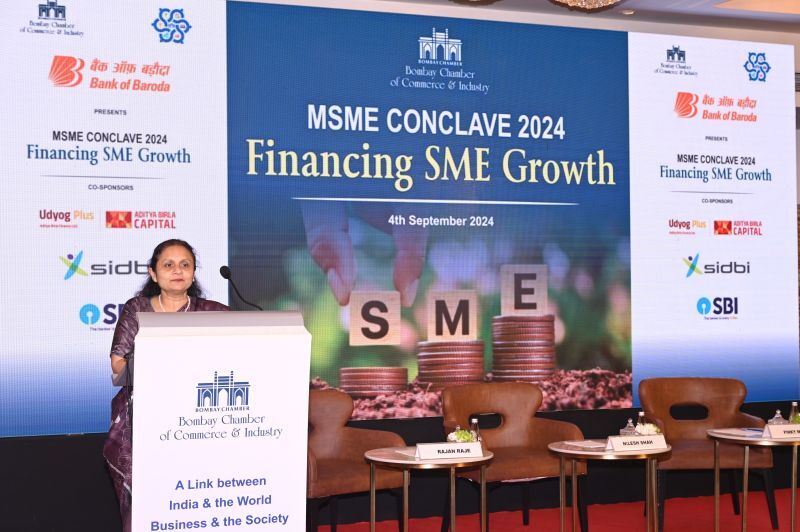
In her welcome address, Pinky Mehta, President of the Bombay Chamber, and Director, Aditya Birla Sun Life Insurance Ltd, highlighted the Chamber’s 188-year legacy in India’s development and its extensive representation of MSMEs. She underscored the Chamber’s commitment to supporting MSMEs in overcoming financial challenges and unlocking their growth potential.
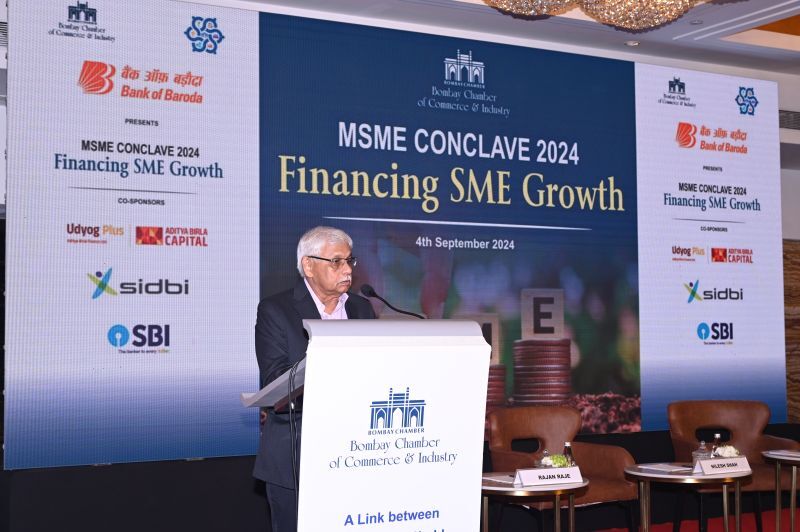
Rajan Raje, Chairperson of the MSME Committee, Bombay Chamber and CEO of Nichem Solutions, set the theme for the Conclave. He emphasised that while the MSME sector is the largest employment generator, it often lacks professionalism and resources. He acknowledged the government’s initiatives, such as the New Credit Guarantee Scheme, increased Mudra Loan limits, and the expansion of the TReDS platform, which support the sector’s growth. “The SME sector must think big and explore the export market systematically,” Raje stated, adding that credit availability is largely determined by the “3 C’s” – Cash Flow, Character, and Collateral.
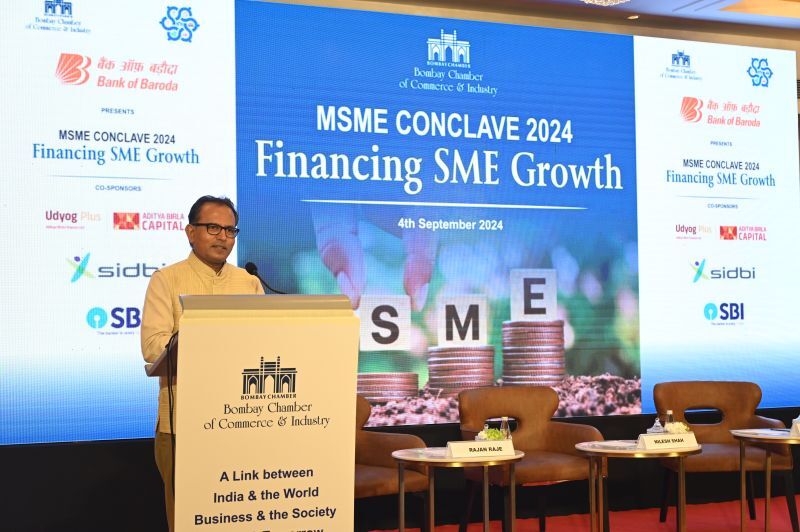
The keynote address was delivered by Nilesh Shah, Group President & MD of Kotak Mahindra AMC, who discussed the challenges and opportunities faced by MSMEs. He spoke about the need for resources in the form of equity, debt, and hybrid financing to enable faster growth. Shah highlighted three successful models that MSMEs could emulate: The Morbi Model: Post-flood rebuilding of Morbi into a ceramics hub, now accounting for 90% of India’s ceramics production with $2 billion in exports. The Tirupur Model: Textile manufacturers form a cooperative for efficient cost management and industry-scale benefits, including centralised purchasing, advertising, and pollution management and the Amul Model: The cooperative that transformed India into the world’s largest milk producer and aims to be the largest FMCG company by 2047. Shah also lauded the Reserve Bank of India’s new system for instant verification of SMEs and borrowers, which will significantly shorten the credit appraisal cycle.
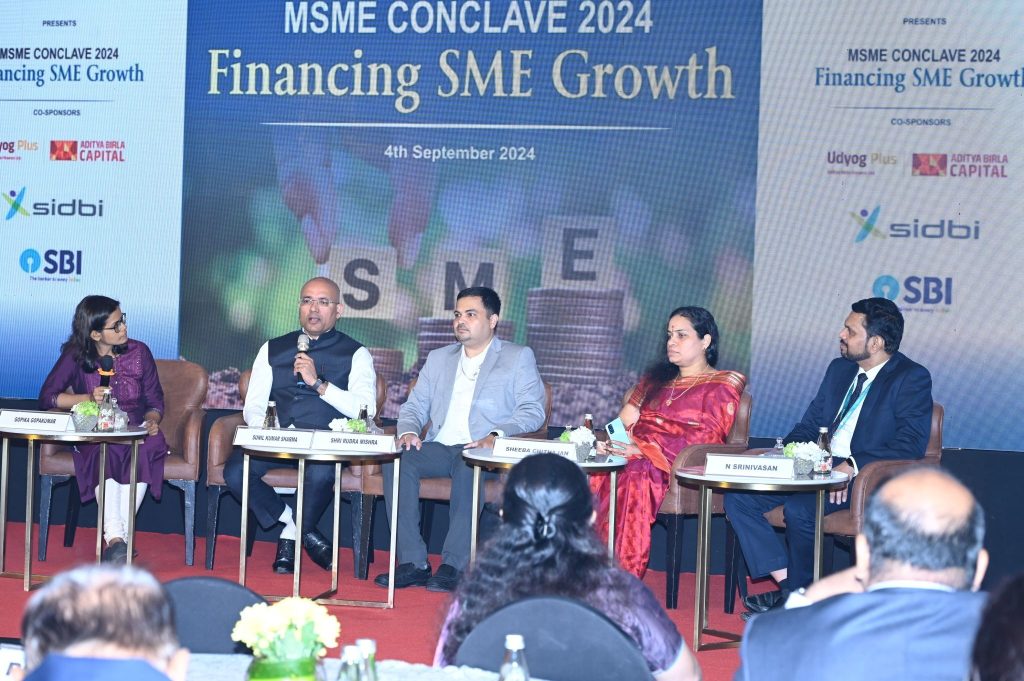
The Conclave featured two insightful panel discussions. The first panel on “Export-Import Financing” for SMEs, moderated by Gopika Gopakumar, Senior Assistant Editor, Livemint, Mr. Sunil Kumar Sharma, General Manager & Zonal Head, Bank of Baroda, Shri Rudra Mishra, Assistant General Manager, SIDBI, N Srinivasan, General Manager Transaction Banking, IDBI Bank and Sheeba Chithajan, DGM (SME) SBI LHO Mumbai Metro. They discussed how their institutions are supporting SMEs in entering and thriving in the export market, including the range of financial products available for the MSME sector. They highlighted the hygiene factors that banks expect SMEs to meet before receiving export support. The panel also examined the challenges MSMEs face in accessing funding, especially for exports to developing countries, and shared success stories and their impacts on SME growth.
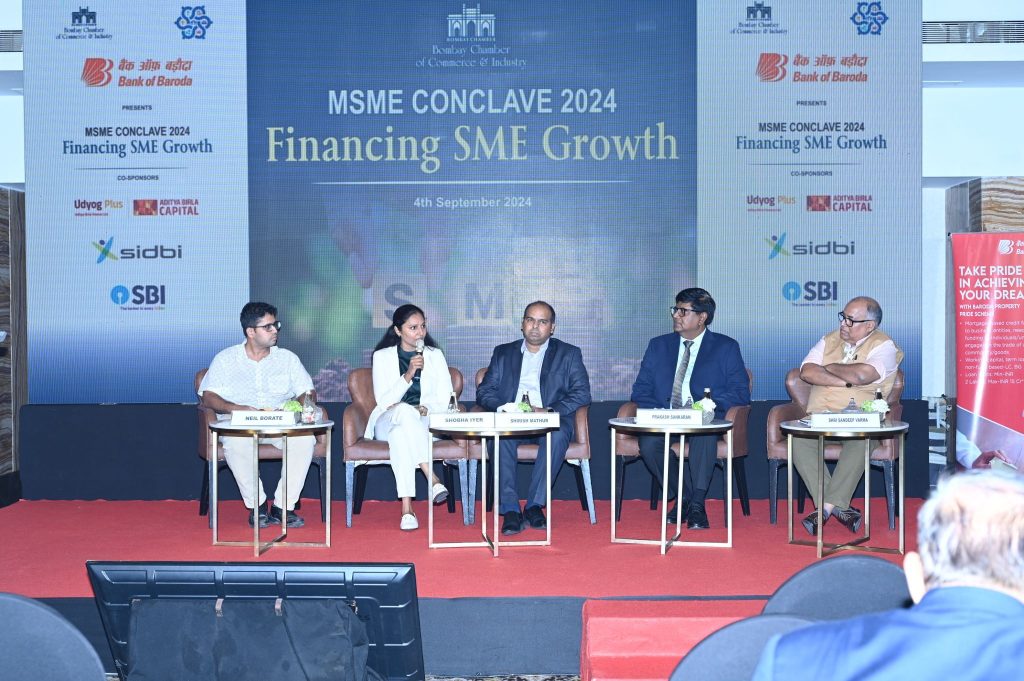
The second panel, titled “Financing Through NBFCs,” was moderated by Neil Borate, Deputy Editor at Livemint, and featured Shobha Iyer, Director Commercial at Olea; Shirish Mathur, Head of SME Products & Digital Platforms at Aditya Birla Finance Ltd.; Prakash Sankaran, Managing Director & CEO of Invoicemart; and Sandeep Varma, CEO of the Credit Guarantee Fund Trust for Micro and Small Enterprises (CGTMSE). The discussion highlighted the crucial role of Non-Banking Financial Companies (NBFCs) in supporting SMEs through tailored financial products, flexible loan terms, and faster processing times compared to traditional banks. The panellists also explored potential solutions, including government subsidies, credit guarantees, and fostering a competitive lending environment to help reduce interest rates.
In a fireside chat titled “Catalysing SME Growth Through Innovative Financing Solutions,” Shri Deependra Singh Kushwah, I.A.S., Development Commissioner (Industries), Government of Maharashtra, discussed government initiatives to support MSMEs, including the MAITRI portal and the MIDC Plug and Play facility. He also requested members of the MSME sector to leverage these tools and initiatives and proactively approach the Government for any support or guidance.
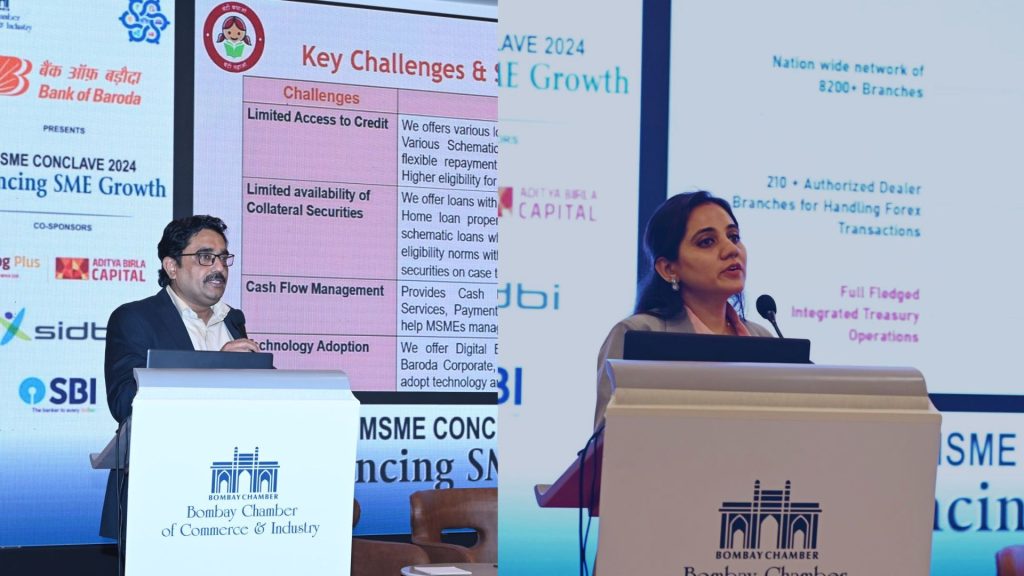
The Conclave also featured a presentation by the Bank of Baroda on “Empowering MSME Growth: Leveraging Our Flagship Products & Trade Finance Offerings,” delivered by Sandeep Prakash, Assistant General Manager of MSME Sales, and Tania Das, Senior Manager of the Forex Department, Mumbai Zone. Additionally, Shirish Mathur presented the facilities and services available to MSMEs on the Aditya Birla Udyog Plus website.
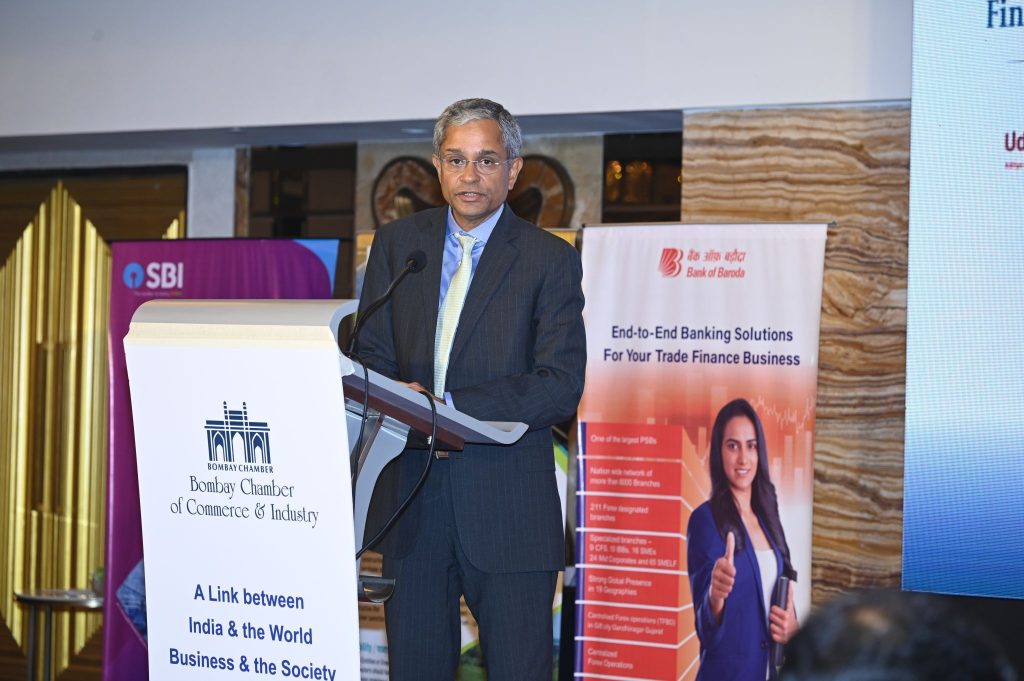
Rajiv Anand, Senior Vice President of the Bombay Chamber and Deputy Managing Director of Axis Bank, delivered the Vote of Thanks . The event was supported by Bank of Baroda, Aditya Birla Finance Ltd., SIDBI, and SBI.
GatiShakti evaluates six infrastructure projects
GatiShakti evaluates six infrastructure projects
The 77th meeting of the Network Planning Group (NPG) under the PM GatiShakti initiative was recently convened in New Delhi under the chairmanship of Additional Secretary, Department for Promotion of Industry and Internal Trade (DPIIT), Shri Rajeev Singh Thakur. The meeting focused on evaluating six important infrastructure projects from Ministry of Railways (MoR), Ministry of Road Transport and Highways (MoRTH), Ministry of Civil Aviation (MoCA) and Ministry of Ports, Shipping and Waterways (MoPSW) were evaluated for their alignment with the principles of integrated planning outlined in the PM GatiShakti National Master Plan (NMP). The evaluation and their anticipated impacts of these projects are detailed below.
Hazira – Gothangam New Rail Line in Gujarat
A greenfield project in Gujarat involving the construction of a 36.35 km Broad Gauge (BG) Double Line connecting Gothangam to Hazira. This project aims to enhance section capacity and improve connectivity to major industries and Hazira port, a key cargo hub. By supporting the efficient movement of bulk and containerized cargo, the project is expected to foster regional economic development, reduce road traffic, and minimise environmental impacts through the modal shift of the cargo from road to rail transportation.
Bilasipara – Guwahati Road in Assam
A strategic road upgrade in Assam to 4-lane NH-17, covering a 44.56 km stretch between Chirakuta (Bilasipara) and Tulungia. This project will enhance regional connectivity, linking Assam to West Bengal, Meghalaya, and important infrastructure such as the Multi Modal Logistics Park at Jogighopa and Rupsi and Guwahati Airports. It is expected to significantly boost economic activities, reduce travel time, and alleviate congestion in the region.
Multi-Modal Logistics Park (MMLP) in Nashik, Maharashtra
Development of a Multi-Modal Logistics Park (MMLP) in Nashik, Maharashtra, over 109.97 acres. This greenfield project is designed to integrate road and rail transport, improving logistics efficiency, reducing costs, and supporting regional industries by providing facilities such as cargo consolidation, storage, and customs clearance. The project is anticipated to handle 3.11 million metric tons of cargo annually from 2029 onwards.
Development of New Civil Enclave at Bihta Airport, Patna Bihar
A brownfield project in Bihar involves the development of a new civil enclave at Bihta Airfield, 28km from Jay Prakash Narayan International Airport in Patna. This project addresses capacity constraints at Patna Airport and includes a new terminal building capable of handling 5 million passengers annually. The project also involves a 10-bay apron for A-321 aircraft, with the aim of accommodating growing passenger traffic and improving connectivity in the region.
Development of New Civil Enclave at Bagdogra Airport, Siliguri, West Bengal
A brownfield project involving the development of a new civil enclave at Bagdogra Airport, in the Darjeeling district of West Bengal. The expansion includes constructing a new terminal building with a capacity to handle 10 million passengers annually and an apron for 10 aircraft. Located strategically in the & chicken neck area, Bagdogra Airport serves as a critical gateway to the North-eastern region of the country, and this expansion is essential for meeting the region’s growing connectivity needs.
Development of international Container Transshipment Port al Galathea Bay in Andaman & Nicoba
A transformative project for developing an International Container Transshipment Port (ICTP) at Galathea Bay on Great Nicobar Island in the Union Territory of Andaman & Nicobar. With a project cost of Rs. 44,313 crores, this greenfield initiative aims to capitalise on the strategic location and deeper waters of the bay. The port is expected to handle transshipment cargo from Indian ports, and the neighbouring countries in the region, enhancing India’s maritime trade competitiveness and generating substantial economic benefits.
NPG evaluated all six projects from the perspective of the principles of PM GatiShakti: integrated development of multimodal infrastructure, last-mile connectivity to economic and social nodes, intermodal connectivity, and synchronised implementation of projects. These projects are expected to play pivotal roles in nation-building, integrating various modes of transport, and providing substantial socio-economic benefits and ease of living, thereby contributing to the overall development of the regions.
Indian Institute of Foreign Trade improves 12 ranks in NIRF ranking
Indian Institute of Foreign Trade improves 12 ranks in NIRF ranking
From 27th rank in 2023 to 15th this year, the Indian Institute of Foreign Trade (IIFT) under Ministry of Commerce and Industry, Government of India has made a steep jump of 12 spots in its NIRF (National Institutional Ranking Framework) ranking released by Ministry of Education. This has been a record improvement in the institute’s ranking since beginning of NIRF ranking in 2016.
Congratulating IIFT on this remarkable feat Union Minister of Commerce and Industry, Shri Piyush Goyal expressed his confidence that the institute would soon transform into a world class institute that would greatly contribute to India’s impressive growth in trade and investments. From 27th rank in 2023 to 15th rank this year, the Indian Institute of Foreign Trade (IIFT) Delhi has made a remarkable progress. With India’s growing influence in global trade this achievement highlights IIFT’s crucial role in nurturing future leaders in international business, he said.
Shri Sunil Barthwal, Secretary, Department of Commerce and Chancellor, IIFT, also congratulated on this remarkable achievement and expressed full support from Department of Commerce to conduct cutting-edge research on contemporary issues in international trade including bilateral and multilateral trade engagements, exports promotion and institutional development.
In the recent months, various measures of the institute have been recognised. The institute has taken a host of holistic initiatives to improve its teaching, learning and resources, research and professional practices, graduation outcomes, outreach and inclusivity and perception.
IIFT is on the path of rapid transformation into a world class B-School of global repute with special focus on international trade and business making it a unique institute that conducts highly sought after educational programmes such as Ph.D., MBA (International Business), MBA (Business Analytics) and MA Economics specialising in International Trade and Finance.
As a part of new initiatives, the institute is in the process of establishing a state of art Centre for International Negotiations (CIN) to provide training to corporates and policy makers on international negotiations. Besides, IIFT is also establishing Foreign Trade Case Study Centre (FTCSC) to work closely with exporters, governments and businesses and develop world class case studies on the lines of Harvard and share Indian experiences on International Trade with the rest of the world.
The institute plans to work closely with the governments, central and states and carry out insightful research on issues of contemporary importance besides high-end capacity building programmes. Various export promotion organisations such as APEDA have evinced keen interest to sponsor PhD students on the area of contemporary research interest.
IIFT is also contemplating to commence an offshore campus in Dubai with an active support from Department of Commerce, Ministry of Commerce and Industry.
MoU between Ministry of MSME and Small Business Administration (SBA), Government of United States of America
MoU between Ministry of MSME and Small Business Administration (SBA), Government of United States of America
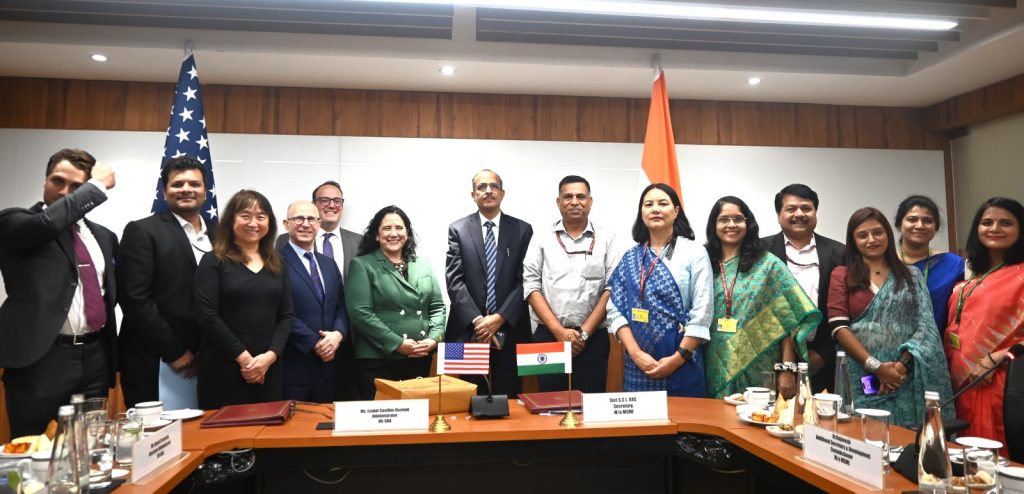
Shri S. C. L Das, Secretary, Ministry of Micro, Small and Medium Enterprises, Government of India and Ms. Isabel Casillas Guzman, Administrator, Small Business Administration (SBA), Government of the United States of America, in keeping with the direction given by the Leaders of the two countries in the India-US Joint Statement of June 2023, signed a Memorandum of Understanding for promoting Cooperation on Small and Medium-size Enterprises on 13th August 2024 in New Delhi.
The MoU provides a framework for both sides to discuss issues concerning micro, small and medium enterprises (MSMEs) and explore possibilities of cooperation. It envisages the exchange of expertise between the two sides on issues related to improving MSME participation in the global marketplace through mutual visits as well as webinars and workshops on topics including access to trade and export finance; technology and digital trade; green economy; and trade facilitation. It also provides for the joint conduct of programmes for women entrepreneurs to empower them and facilitate trade partnership between women-owned small businesses of the two countries.
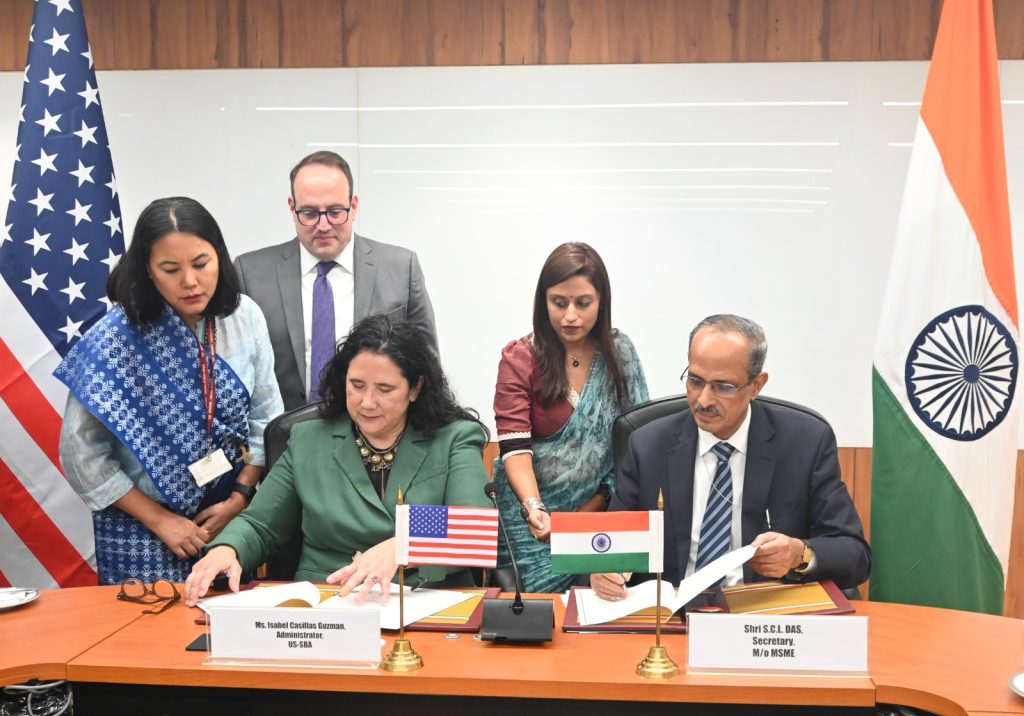
Recognizing the crucial role that MSMEs play in advancing inclusive growth, expanding exports, and boosting employment, the two sides also agreed to explore the development of a “Business Matching Digital Platform” to boost business opportunities.
Over 1 lakh 40 thousand recognized Start Ups in the country
Over 1 lakh 40 thousand recognized Start Ups in the country
DPIIT has recognised 1,40,803 entities as startups. Since the launch of Startup India initiative in 2016, the DPIIT- recognised startups have created over 15.53 lakh direct jobs till June 2024. Further,67,499 DPIIT-recognised start-ups have at least one-woman director.
The Government unveiled an Action Plan for Startups comprising of schemes and incentives envisaged to create a vibrant startup ecosystem in the country. The Action Plan comprises of 19 action items spanning across areas such as “Simplification and handholding”, “Funding support and incentives” and “Industry-academia partnership and in cubation”.
For attaining specific objectives of the Action Plan, various programs are implemented by the Government under the Startup India initiative to recognize, develop, promote, and empower the startup ecosystem. All the steps under taken by the Government under the said initiative are inclusive and are implemented across States/UTs.
The State/Union Territory (UT)-wise details of number of DPIIT recognised startups in the past two years viz. 2022 and 2023 are placed as given below:.
The State/UT- wise number of DPIIT recognized startups during the past two years viz. 2022 and 2023 are as under:
| S.No. | State/UT | 2022 | 2023 |
| 1. | AndamanandNicobarIslands | 9 | 13 |
| 2. | AndhraPradesh | 381 | 586 |
| 3. | ArunachalPradesh | 9 | 17 |
| 4. | Assam | 285 | 362 |
| 5. | Bihar | 525 | 812 |
| 6. | Chandigarh | 81 | 126 |
| 7. | Chhattisgarh | 237 | 362 |
| 8. | DadraandNagarHaveliandDamanandDiu | 12 | 11 |
| 9. | Delhi | 2,580 | 3,162 |
| 10. | Goa | 107 | 98 |
| 11. | Gujarat | 2,282 | 3,295 |
| 12. | Haryana | 1,334 | 1,742 |
| 13. | HimachalPradesh | 120 | 144 |
| 14. | JammuandKashmir | 170 | 246 |
| 15. | Jharkhand | 239 | 337 |
| 16. | Karnataka | 2,568 | 3,036 |
| 17. | Kerala | 1,078 | 1,296 |
| 18. | Ladakh | 5 | 5 |
| 19. | Lakshadweep | 0 | 2 |
| 20. | MadhyaPradesh | 898 | 1,267 |
| 21. | Maharashtra | 4,813 | 5,816 |
| 22. | Manipur | 31 | 26 |
| 23. | Meghalaya | 10 | 18 |
| 24. | Mizoram | 6 | 13 |
| 25. | Nagaland | 7 | 22 |
| 26. | Odisha | 451 | 620 |
| 27. | Puducherry | 30 | 43 |
| 28. | Punjab | 294 | 443 |
| 29. | Rajasthan | 992 | 1,445 |
| 30. | Sikkim | 2 | 2 |
| 31. | TamilNadu | 1,811 | 2,816 |
| 32. | Telangana | 1,381 | 1,760 |
| 33. | Tripura | 27 | 23 |
| 34 | UttarPradesh | 2,583 | 3,431 |
| 35 | Uttarakhand | 236 | 271 |
| 36 | WestBengal | 1,002 | 1,174 |
| GrandTotal | 26,596 | 34,842 |
The Government, with the objective of building a strong ecosystem for nurturing innovation, start-ups and encouraging investments in the startup ecosystem of the country, launched the Startup India initiative on 16th January 2016.
As per eligibility conditions prescribed under G.S.R. notification 127 (E) dated 19th February 2019, entities are recognized as ‘startups’ under the Startup India initiative by the Department for Promotion of Industry and Internal Trade (DPIIT).
The detail so of various programs under taken by the Government to promote startups across the country are as under: Startup India Action Plan: An Action Plan for Startup India was unveiled on16th January 2016. The Action Plan comprises of 19 action items spanning across areas such as “Simplification and handholding”, “Funding support and incentives” and “Industry-academia partnership and incubation”. The Action Plan laid the foundation of Government support, schemes and incentives envisaged to create vibrant startup ecosystem the country.
2. Startup India: The Way Ahead: Startup India: The Way Ahead at 5 years celebration of Startup India was unveiled on 16th January 2021 which includes actionable plans for promotion of ease of doing business for startups, greater role of technology in executing various reforms, building capacities of stakeholders and enabling a digital Atma Nirbhar Bharat.
3. Startup India Seed Fund Scheme (SISFS): Easy availability of capital is essential for entrepreneurs at the early stages of growth of an enterprise. The capital required at this stage often presents a make-or-break situation for startups with good business ideas. The Scheme aims to provide financial assistance to startups for proof of concept, prototype development, product trials, market entry and commercialization. Rs. 945 crore has been sanctioned under the SISFS Scheme for a period of 4 years starting from 2021- 22.
4. Fund of Funds for Startups (FFS) Scheme: The Government has established FFS withcorpus of Rs. 10,000 crore, to meet the funding needs of startups. DPIIT is the monitoring agency and Small Industries Development Bank of India (SIDBI) is the operating agency for FFS. The total corpus of Rs. 10,000 crore is envisaged to be provided over the 14th and15th Finance Commission cycles based on progress of the scheme and availability of funds. It has not only made capital available for startups at early stage, seed stage and growth stage but also played a catalytic role in terms of facilitating raising of domestic capital, reducing dependence on foreign capital and encouraging home grown and new venture capital funds.
5. Credit Guarantee Scheme for Startups (CGSS): The Government has established the Credit Guarantee Scheme for Startups for providing credit guarantees to loans extended to DPIIT recognized startups by Scheduled Commercial Banks, Non-Banking Financial Companies (NBFCs) and Venture Debt Funds (VDFs) under SEBI registered Alternative Investment Funds. CGSS is aimed at providing credit guarantee up to a specified limit against loans extended by Member Institutions (MIs) to finance eligible borrowers viz. DPIIT recognised startups.
6. Regulatory Reforms: Over 55 regulatory reforms have been undertaken by the Government Since 2016 to enhance ease of doing business, ease of raising capital and reduce compliance burden for the startup ecosystem.
7. Ease of Procurement: To enable ease of procurement, Central Ministries/ Departments are directed to relax conditions of prior turnover and prior experience in public procurement for all DPIIT recognised startups subject to meeting quality and technical specifications. Further, Government e- Marketplace (GeM) also facilitates and promotes procurement of products and services by the Government from startups.
8. Self-Certification under Labour and Environmental laws: Startups are allowed to self-certify their compliance under 9 Labour and 3 Environment laws for a period of 3 to 5 years from the date of incorporation.
9. Income Tax Exemption for 3 years: Startups incorporated on or after 1st April 2016 can apply for income tax exemption. The recognized startups that are granted an Inter-Ministerial Board Certificate are exempted from income- tax for a period of 3 consecutive years out of 10 years since incorporation.
10. Faster Exit for Startups: The Government has notified Startups as ‘fast track firms’enabling them to wind up operations within 90 days vis-a-vis 180 days for other companies.
11. Exemption for the Purpose Of Clause (VII)(b) of Sub-section (2) of Section 56 of theAct (2019): A DPIIT recognized startup is eligible for exemption from the provisions of section 56(2)(viib) of the Income Tax Act.
12. Support for Intellectual Property Protection: Startups are eligible for fast- tracked patent application examination and disposal. The Government launched Start-ups Intellectual Property Protection (SIPP) which facilitates the startups to file applications for patents, designs and trademarks through registered facilitators in appropriate IP offices by paying only the statutory fees. Facilitators under this Scheme are responsible for providing general advisory on different IPRs, and information on protecting and promoting IPRs in other countries. The Government bears the entire fees of the facilitators for any number of patents, trademarks or designs, and startups only bear the cost of the statutory fees payable. Startups are provided with an 80% rebate in filing of patents and 50% rebate in filing of trademark vis-a-vis other companies.
13. Startup India Hub: The Government launched a Startup India Online Hub on 19th June2017 which is one of its kind online platform for all stakeholders of the entrepreneurial ecosystem in India to discover, connect and engage with each other. The Online Hub hosts Startups, Investors, Funds, Mentors, Academic Institutions, Incubators, Accelerators, Corporates, Government Bodies and more.
14. International Market Access to Indian Startups: One of the key objectives under the Startup India initiative is to help connect Indian startup ecosystem to global startup ecosystems through various engagement models. This has been done though international Government to Government partnerships, participation in international forums and hosting of global events. Startup India has launched bridges with around 20 countries that provides a soft- landing platform for startups from the partner nations and aid in promoting cross collaboration.
15. Startup India Showcase: Startup India Showcase is an online discovery platform for the most promising startups of the country chosen through various programs for start-ups exhibited in a form of virtual profiles. The startups showcased on the platform have distinctly emerged as the best in their fields. These innovations span across various cutting-edge sectors such as Fintech, EnterpriseTech, Social Impact, HealthTech, EdTech, among others. These startups are solving critical problems and have shown exceptional innovation in their respective sectors. Ecosystem stakeholders have nurtured and supported these startups, there by validating their presence on this platform.
16. National Startup Advisory Council: The Government in January 2020 notified constitution of the National Startup Advisory Council to advise the Government on measures needed to build a strong ecosystem for nurturing innovation and startups in the country to drive sustainable economic growth and generate large scale employment opportunities. Besides The ex-officio members, the council has a number of non-official members, representing various stakeholders from the startup ecosystem.
17. National Startup Awards (NSA): National Startup Awards is an initiative to recognize and reward outstanding startups and ecosystem enablers that are building innovative products or solutions and scalable enterprises, with high potential of employment generation or wealth creation, demonstrating measurable social impact. Handholding support is provided to all the finalists across various tracks viz. Investor Connect, Mentorship, Corporate Connect, Government Connect, International Market Access, Regulatory Support, Startup Champions On Doordarshan and Startup India Showcase, etc.
18. States’ Startup Ranking Framework (SRF): States’ Startup Ranking Framework is a unique initiative to harness strength of competitive federalism and create a flourishing startup ecosystem in the country. The major objectives of the ranking exercise are facilitating states to identify, learn and replace good practices, highlighting the policy intervention by states for promoting startup ecosystem and fostering competitiveness among states.
19. Startup Champions on Doordarshan: Startup Champions program on Doordarshan is a one- hour weekly program covering stories of award winning/ nationally recognised startups. It is telecasted in both Hindi and English across Doordarshan network channels.
20. Startup India Innovation Week: The Government organises Startup India Innovation week around the National Startup Day i.e., 16th January, with the primary goal was to bring together the country 39; key startups, entrepreneurs, investors, incubators, funding entities, banks, policymakers, and other national/international stakeholders to celebrate entrepreneurship and promote innovation.
21. ASCEND: Under ASCEND (Accelerating Startup Caliber & Entrepreneurial Drive), sensitization workshops on startups and entrepreneurship were conducted for all eight North Eastern States with the objective to capacitate and augment knowledge on key aspects of entrepreneurship and continue efforts towards creating a robust startup ecosystem in these States.
22. The Startup India Investor Connect Portal: has been co-developed under the Startup India Initiative with SIDBI, serving as an intermediary platform that links startups and investors in order to help entrepreneurs from various industries, functions, stages, regions, and backgrounds in mobilizing capital. The portal has been built with the aim to enable in particular; early-stage startups located anywhere in the country to showcase themselves to leading investors/ venture capital funds.
23. National Mentorship Portal (MAARG): In order to facilitate accessibility to mentorship for startups in every part of the country, the Mentorship, Advisory, Assistance, Resilience, and Growth (MAARG) program has been developed and launched under the Startup India Initiative.
24. MeitY Start-up Hub (MSH): A nodal entity to interconnect deep tech startup infrastructure an India, the ‘MeitY Start-up Hub’ (MSH) has been set up under Ministry of Electronics & Information Technology (MeitY). MSH is assisting incubators and startups improving their scalability, market outreach, etc. and has also established partnerships with various stakeholders paving the way for an economy built on innovation and technological advancement.
25. TIDE 2.0 Scheme: Technology Incubation and Development of Entrepreneurs (TIDE 2.0)Scheme was initiated in the year 2019 to promote tech entrepreneurship through financialand technical support to incubators engaged in supporting ICT startups using emerging technologies such as IoT, AI, Block-chain, Robotics etc. The Scheme is being implemented through incubators through a three-tiered structure with an overarching objective to promote incubation activities at institutes of higher learning and premier Research & Development (RD) organisations.
26. Domain specific Centres of Excellence: MeitY has operationalised Centres of Excellence (CoEs) in diverse areas of national interest for driving self- sufficiency and creating capabilities to capture new and emerging technology areas. These domain specific CoEs act as enablers and aid in making India an innovation hub in emerging through democratisation of innovation and realisation of prototypes.
27. Biotechnology Industry Research Assistance Council (BIRAC): An industry-academia interface agency of Department of Biotechnology, Ministry of Science & Technology is supporting biotech startups in all biotech sectors including clean energy and emerging technologies. Project based funding is provided to startups and companies for product/technology development under its key Schemes including Biotech Ignition Grant(BIG), Small Business Innovation Research Initiative (SBIRI) and Biotechnology Industry Partnership Programme (BIPP). Incubation support to the startups and companies is also provided through Bio Incubators Nurturing Entrepreneurship for Scaling Technologies (BioNEST) Scheme.
28. SAMRIDH Scheme: MeitY has launched the ‘Start-up Accelerator Programme of MeitY for Product Innovation, Development and Growth (SAMRIDH)’ with an aim to support existing and upcoming Accelerators to further select and accelerate potential software product-based startups to scale.
29. Next Generation Incubation Scheme (NGIS): NGIS has been approved to support software product ecosystem and to address a significant portion of National Policy on Software Product (NPSP) 2019.
30. Support for International Patent Protection in E&IT (SIP-EIT) Scheme: MeitY had initiated a scheme titled “Support for International Patent Protection in E&IT (SIP-EIT)that encourages international patent filing by Indian Micro, Small and Medium Enterprises(MSMEs) and startups so as to encourage innovation and recognize the value and capabilities of global IP.
31. North-East Region Entrepreneurship & Startup Summit (NERES): Ministry of Skill Development and Entrepreneurship organised NERES, an entrepreneurship and startup summit aimed at offering a platform to promising startups and aspiring entrepreneurs across North-East Region (NER). The objective of NERES was aimed at stirring up entrepreneurial minds across the NER states and promotes startup entrepreneurs by offering them a platform to pitch their business ideas and also addressing various challenges faced by the startups. The programme provided a platform for aspiring and existing entrepreneurs/startups to participate and showcase their business ideas and plan. It also helped them to learn more about the good practices and network with fellow startups. The Programme has paved the way for startups and entrepreneur to seek support from mentors and an ecosystem that support their business growth.
32. Atal Innovation Mission: The Atal Innovation Mission (AIM) is a flagship initiative of the Government, set up by NITI Aayog to promote innovation and entrepreneurship across the length and breadth of the country. AIM has established Atal Tinkering Labs (ATLs) with the objective of fostering curiosity, creativity and imagination in young minds and inculcate skills such as design mind-set, computational thinking, adaptive learning, physical computing, rapid calculations, measurements etc.
33. National Initiative for Developing and Harnessing Innovations (NIDHI): Department of Science and Technology (DST) had launched an umbrella programme called National Initiative for Developing and Harnessing Innovations (NIDHI) in 2016 for nurturing ideas and innovations (knowledge- based and technology-driven) into successful startups.
34. Innovations for Defence Excellence (iDEX): iDEX was launched by the Department of Defense Production, Ministry of Defense, to achieve self- reliance and foster innovation and technology development in Defense and Aerospace by engaging industries such as MSMEs and startups, R&D institutes and academia and providing grants to carry out R&D. This information has been recently provided by the Union Minister of State for Commerce and Industry, Shri Jitin Prasadain a written reply in the Rajya Sabha.
Quality Council of India introduces QCI Surajya recognition & ranking framework to drive excellence in key sectors
Quality Council of India introduces QCI Surajya recognition & ranking framework to drive excellence in key sectors
The Quality Council of India (QCI) is introducing the QCI Surajya Recognition & Ranking Framework, an empowering initiative designed to drive excellence among states to improve quality of life of citizens for a Viksit Bharat. This framework is categorized under four pillars: Shiksha (Education), Swasthya (Health), Samriddhi (Prosperity), and Sushasan (Governance). The Surajya Recognition acknowledges the outstanding performance and commitment to quality by states and organisations in these vital areas.
Enhancing the quality of education (Shiksha) through robust accreditation and certification processes. Guaranteeing superior healthcare (Swasthya) services throughout the nation and upholding the highest standards of medical care in every region. Driving economic prosperity (Samriddhi) through quality assurance in manufacturing and industrial practices. Ensuring transparent, accountable, and responsive governance (Sushasan) that upholds the highest standards of quality.
The August rankings focus on Shiksha, Swasthya, and Samriddhi, with Sushasan to feature in future editions.
In the Shiksha Rankings, Uttar Pradesh leads with the highest number of accreditations, assessments, and ratings. Delhi, as a union territory, also ranks prominently.
In the Swasthya category, Chhattisgarh, Karnataka, Kerala, Rajasthan, Mizoram and Manipur stand out with complete certification in the Ayushman Arogya Yojana (NABH), while Tamil Nadu and Maharashtra lead in the Medical Entry Level Testing Labs (MELT) rankings (NABL). Among the union territories, Chandigarh excels with 100% certification in Ayushman Arogya Yojana, and Jammu & Kashmir shows commendable performance with a 71.43% certification rate. Delhi, followed by Jammu & Kashmir, excels in MELT.
In the Samriddhi category, Gujarat, Karnataka, and Rajasthan lead with the highest number of ZED certifications, particularly in the Micro category. Jammu & Kashmir and Delhi also achieved significant certifications in ZED. For the MSME Competitive LEAN Scheme, Maharashtra and Bihar are the top performers.
Introducing the Surajya Recognition and Ranking Framework, Shri Jaxay Shah, Chairperson, QCI, stated, “Our states are our strengths, and their collective synergy is the driving force behind creating a Viksit Bharat. Through Surajya, we aim to promote high standards and best practices in key sectors of India, paving the way for states to achieve and maintain the highest standards of excellence. This initiative celebrates their commitment to quality and continuous improvement.”
The QCI Surajya Recognition & Ranking Framework, beginning with the August 2024 rankings, sets a new benchmark for excellence across the nation. The rankings have been compiled, incorporating both monthly and cumulative figures across various initiatives to ensure a comprehensive and balanced evaluation. It aims to create a developed India by recognizing and rewarding states and organizations that excel in quality and innovation. With a strong emphasis on enhancing collaborative governance and fostering sustainable development, this framework is a significant step towards building a prosperous and quality-driven Viksit Bharat.
Government policies have potential to boost Rupee: Piyush Goyal
Government policies have potential to boost Rupee: Piyush Goyal

Union Minister of Commerce & Industry, Shri Piyush Goyal during an interaction here expressed hope that government efforts to boost semiconductor manufacturing, domestic shipping and a reduction in imports of oilseeds, rubber and pulses will help the rupee appreciate against the dollar.
The Union Minister was speaking at the ASSOCHAM’s launch event of the book titled “Bharat@100: Envisioning Tomorrow’s Economic Powerhouse” written by former Chief Economic Advisor Shri KV Subramanian. Shri Subramanian in the book predicts India can achieve a $55 trillion economy by 2047 if the nation sustains an 8% annual growth rate.
Speaking on the occasion, Shri Goyal said that a stable economy will push India to be among the top 3 world economies. The Centre will ensure a better quality of life to the last man at the bottom of the pyramid in the next five years, he said, adding that the government is also focussed on efforts to replace the oil economy with electric mobility and making quality the fulcrum in manufacturing. He noted that steps undertaken by the Government such as self- sufficiency in defence, transparency and technology, stronger currency and macroeconomic fundamentals will spur India to become a developed nation.
Speaking about the rapid growth of China, Shri Goyal said that India is at the same sweet spot today as China was between 2000-2020 when they grew at 8% based on a stable economy and low inflation. “Our political and social problems will eventually reduce, our economy will grow faster and we can replicate China’s growth story”, said the Union Minister.
Speaking on ethical wealth creation and the need for private investment, Shri Goyal lauded Prime Minister Narendra Modi’s commitment to recognise the contribution of wealth creators in the private sector and businesses.
“PM Modi values wealth creators for their role in job creation and for providing goods and services for the citizens”, he said. He further added that the PM’s speech at CII Post-Budget Conference has brought to the fore the importance of manufacturing to India’s growth story and the need for stable policies to make India a developed nation by 2047.
Commerce Secretary participates in the 14th BRICS Trade Ministers’ Meeting
Commerce Secretary participates in the 14th BRICS Trade Ministers’ Meeting
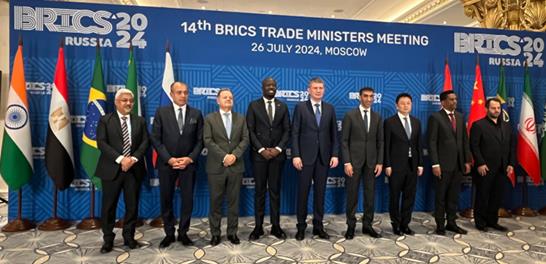
Commerce Secretary Shri Sunil Barthwal attended the 14th BRICS Trade Ministers’ Meeting held on 26 July 2024 under the BRICS Presidency of Russian Federation. The theme of BRICS this year is “Strengthening Multilateralism for Just Global Development”. While congratulating the Russian Presidency for the bringing in proposal on contemporary issues, Shri Sunil Barthwal, welcomed the new members of BRICS (Iran, Egypt, Ethiopia and UAE) and congratulated them on their fruitful participation in discussions, this year.
The Commerce Secretary expressed the need for strengthening multilateral trading system with WTO at its core, effective functioning of Joint Value Chains, expanding interaction among MSMEs, India’s successful story on Digitalisation and E-Commerce and the relevance of cooperation among Special Economic Zones.
On the strengthening Multilateralism, he reiterated on the collective efforts to find a solution for long pending mandated issues of WTO, in particular, the development aspect and the Special and Differential treatment. He stressed on the urgent need for resolving the issues including the permanent solution to Public Stock Holding, constitution of two-tier Dispute Settlement system, WTO Reform to be based on the principles & objectives of WTO, leading to more responsive to development requirements of emerging economies, invigorating the WTO through “30 for 30” bringing in alt least 30 operational improvements to the WTO before the organization completes 30 years in 2025. He stressed upon strengthening the resiliency of supply chain through decentralisation and diversification, furthering co-operation in value chains through G20 generic Mapping framework for GVCs and by enunciating guiding principles for collaboration. In this context, as an initial step towards digitalisation, he stressed on paperless trade including digitalisation of documents like Bill of lading.
He laid emphasis on collaboration for making access to affordable emerging technologies critical for green transition and climate resilience. On the climate related unilateral measures impacting trade, Commerce Secretary expressed concern as such measures nullify rights and obligations under specialised Multilateral Environmental Agreements and violative NDC Principles, and ignores the CBDR principles.
The Commerce Secretary also mentioned the importance on MSME related developments and their integration with the Global Value Chains. While re-iterating the Jaipur call for action for enhancing access to information for MSMEs issued during India’s Presidency in 2023, he lauded the Russian Presidency for carrying forward the initiative by making efforts to compile certain basic information pertaining to MSMEs among the BRICS members. As MSME’s are an integral part of the BRICS Members, Commerce Secretary stressed on the importance of cooperation and collective efforts for outcome oriented support for MSMEs. He expressed the need to focus on key areas like, exploring cooperation in the form of Research and Development, Technology transfers and joint Ventures as well as the Business development opportunities.
Commerce Secretary underscored the urgency of accelerating inclusive digital transformation. While referring to India’s success story of building up an open source India Stack of Critical Digital Public infrastructure as part of its digital industrialisation following the core principles of open access, transparency, trust and respect for data protection and privacy, expressed India’s willingness to share its experience with the BRICS countries on the e-revolution in the domains of payments, e-commerce, national identity, banking, education etc,
On the Russian presidency’s initiative on cooperation in Special Economic Zones (SEZs), Commerce Secretary acknowledged the transformative impact of SEZs in providing employment, state of art technologies, boosting exports. He underscored the importance of exchanging information and best practices regarding the same.
In conclusion, Commerce Secretary laid stress upon the importance of collaborative efforts and commitment along with resilience, unity and transparency to face challenges under the principles of compassion, empathy and understanding, for a common brighter future of BRICS countries.
The Trade Minister’s meeting endorsed the Joint Communique and 6 outcome documents pertaining to various issues mentioned earlier.
Further on the sidelines of BRICS TMM, Commerce secretary had bilateral meetings with the Minister for Economic development Maxim Reshetnikov, Member of the Board (Minister) of Trade, Eurasian Economic Commission Andrey Slepnev, Deputy Minister of Industry and Trade Alexey Gruzdev, and Head of FSVPS, Sergei Dankvert of the Russian Federation as well as with the Deputy Minister for the Department of Trade, Industry & Competition, South Africa, Zuko Godlimpi and the Minister of State for foreign Trade, UAE, Thani Bin Ahmed Al Zeyoudi, wherein bilateral trade issues were discussed in brief for their early resolution.
Budget FY 24-25: FM Sitharaman announces schemes for women, youth & farmers
Budget FY 24-25: FM Sitharaman announces schemes for women, youth & farmers
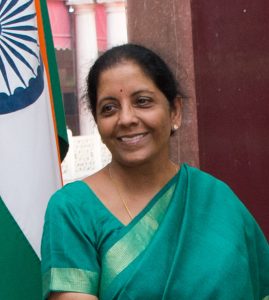
Finance Minister Nirmala Sitharaman presented the Union Budget 2024-25, outlining nine priority areas for the Government, including agriculture, employment, social justice and infrastructure. This budget marks the first presented by the Government after its re-election in June 2024, and the seventh consecutive one presented by Sitharaman.
The budget announced a special focus on women and youth, with the allocation of Rs 3 trillion for schemes benefiting women and girls. Sitaraman also made major announcements for Bihar and Andhra Pradesh, including a boost in infrastructure and special financial support. Additionally, she announced the abolition of angel tax for all classes of investors in startups.
In her budget, the FM also announced a scheme to provide internship opportunities to 1 crore youth in 500 top companies over 5 years.
The Centre’s FY25 capex spend is seen at Rs 11.1 lakh crore, unchanged from the Interim Budget, with infrastructure spend at 3.4% of GDP. The budget also increased standard deduction from Rs 50,000 to Rs 75,000 and family pension deduction from Rs 15,000 to Rs 25,000.
Commenting on the budget, Nilesh Shah, Past President, Bombay Chamber & Group President & MD, Kotak Mahindra AMC, said, “Fiscal Prudence of 4.9% for FY 24 will pave the way for Rating upgrade. Support for employment generation will boost growth. Infrastructure investment at 3.4 % of GDP is elevated yet not crowding out others.”
Pinky Mehta, President, Bombay Chamber and Director, Aditya Birla Sun Life Insurance Co, said “The Union Budget 2024-25, with an allocation of Rs 1.48 lakh crore, prioritises education, employment, and skilling, demonstrating a strong commitment to empowering India’s youth. The Government’s nine focus areas outline a clear roadmap for a Viksit Bharat. Additionally, the removal of angel tax and increase in standard deduction limit are notable reforms, fostering a supportive environment for growth and innovation.”
Rajiv Anand, Sr. Vice President, Bombay Chamber & Deputy Managing Director, Axis Bank, added, “Fiscal prudence will bring down cost of capital for industry and will also help in a sovereign rating upgrade. The budget has focused on most of the key issues; agricultural productivity, growth in MSME, employment and energy transition. Resources have been allocated from capital gains to fund removal of angel tax and reduction of income tax, a welcome relief for the middle class.”
The budget aims to support employment generation, infrastructure development, and innovation, while maintaining fiscal prudence.
Key Highlights:
- Angel Tax abolished for all categories of investors
- STT on F&O increased to 0.2%
- FM keeps capex at Rs 11.11 lakh crore or 3.4% of GDP
- Rs 11.11 lakh crore allocated towards capital expenditure. This would account for 3.4% of the GDP.
- Fiscal deficit lowered to 4.9% of GDP, market borrowing unchanged at Rs 14.13 lakh crore.
- Fiscal deficit for FY25 further scaled down to 4.9 from 5.1% in interim Budget.
- Aim to reach a fiscal deficit of below 4.5% by FY26.
- BCD on mobile phones, chargers reduced to 15%.
- Highest Capex Spending proposed to support the economy and job creation.
- Govt allocates over Rs 3 lakh crore for schemes benefiting women, girls.
- Short-term gains tax on specified financial assets increased from 15% to 20%.
- Long-term gains tax on all assets raised to 12.5% from earlier 10%.
- Social and infrastructure funds announced for Andhra Pradesh, with a backward region grant for three districts.
- Package for Vizag-Chennai industrial corridor.
- Rs 15,000 crore financial assistance for Amaravati’s development with promises for future funding.
- Rs 26,000 crore for roads and expressways in Bihar.
- Funds allocated for temple development in Bihar and Odisha.
- Rs 8,000 crore allocated for Atal Mission for Rejuvenation and Urban Transformation.


It is a long established fact that a reader will be distracted by the readable content of a page when lookin







